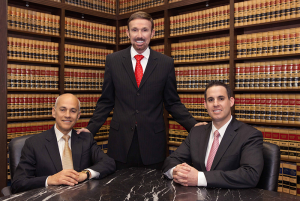Contributing to the Delinquency of a Minor – California Penal Code Section 272 PC

Contributing to the delinquency of a minor (PC 272) is a serious crime in California. This law is essentially meant to prevent people from causing or allowing children to engage in criminal behavior.
There are two basic ways for a person to be charged with this crime. First, a person violates PC 272(a) if he or she acts (or fails to act) in such a way that another person under the age of 18 becomes:
- A dependent of the California juvenile court system;
- A juvenile delinquent; or
- A habitual truant.
Second, a person violates PC 272(b) if he or she contacts a minor under the age of 14 in an effort to lure that minor from his or her parents. To be charged under this code, the defendant must have no pre-existing relationship to the minor (i.e., “a stranger” to the minor).
What are Some Examples of Contributing to the Delinquency of a Minor?
Because the law is meant to punish people for corrupting minors by causing them to commit a crime, there is virtually no limit to the number of ways that a person could be charged with this crime. Here are just a few of the many ways this can happen:
- A father allows his son’s teenage friends to drive home after supplying them with alcohol at a house party;
- A mother shows her daughter how to shoplift items from a department store;
- A stranger tries to lure a 12-year-old boy into a car by telling him that his parents asked the stranger to pick him up from school;
The Prosecution’s Case for Violations of PC 272(a)

In order to convict you for violating California Penal Code 272(a) PC, the prosecution must prove the following elements beyond a reasonable doubt:
- You either committed an act or failed to act while under a legal duty to act; AND
- As a result of the act or failure to act, you caused, encouraged or contributed to causing or encouraging a minor to become a dependent of the California juvenile court system, a juvenile delinquent; or a habitual truant.1
The first element has two parts: committing an act, or failing to perform a duty. Committing an act seems obvious, but it can be defined in two ways. It means that either you acted intentionally, or with criminal negligence. Acting with criminal negligence means that you:
- Acted in a reckless way that created a high risk of death or great bodily injury; AND
- A reasonable person would have known that acting in that way would create such a risk.
It is important to understand that you can be charged with this crime when you fail to act in a way that you were legally required to. Under California law, parents and legal guardians of minors have a duty to exercise reasonable care, supervision, protection and control over the minor. This means that parents or legal guardians can be held responsible if their child engages in criminal behavior because they failed to control their child as any other reasonable parent would.
The second element is that the act or failure to act has to have been a cause of or a contribution to the minor’s actions. This can mean that your act caused or encouraged the minor to commit a crime, to become a “dependent” of the system, or to become a habitual truant.
A dependent of the system is any minor for whom the court has decided to step in and act as a legal guardian. This is commonly the case when Child Protective Services removes a minor from their home because of alleged abuse or neglect.
A habitual truant is a minor who violates an age-based curfew; is persistent in his or her refusal to obey the reasonable orders of his or her parent or guardian; and/or who has four or more unexcused absences from school in a school year.
Prosecution of Contributing to the Delinquency of a Minor
If you are an adult aged 21 years or older, you can be charged with contributing to the delinquency of a minor by transporting or luring a minor under the age of 14 with whom you have no pre-existing substantial relationship. A substantial relationship is one that is more than just a mere acquaintanceship, and not a relationship that is established for the purpose of later victimizing the minor.
To prove that the violation occurred, the prosecution must prove that you:
- Knowingly contacted or communicated with a minor under the age of 14;
- Knew (or were in a position where you reasonably should have known) that the minor was under the age of 14;
- With the intent to persuade, lure, or transport the minor away from his or her parent or legal guardian; or from a place where his or her parent or legal guardian expected the minor to be;
- Without the expressed consent of the minor’s parent or legal guardian; AND
- With the intent to avoid the consent of the minor’s parent or legal guardian.
Defenses to Contributing to the Delinquency of a Minor

- You Had a Reasonable Belief That the Person Was Not a Minor
In many cases involving minors, the accused reasonably believes that the person is not a minor. For example, suppose a man buys a minor a drink at a bar. The minor is 17, but the ID she used to gain entry to the bar states that she is 22. The man could use her act of concealing her true age as a defense to a charge of contributing to the delinquency of a minor.
- The Minor Has a Behavioral Disorder That Makes Him/Her Impossible to Control
California law makes exceptions for those who are legal guardians of a minor with a behavioral disorder. Often, a parent can successfully use the existence of such a condition as a defense to these charges.
- False Accusations
Oftentimes accusations arise from one parent of the minor against the other. This kind of accusation is usually made in bitter custody battles, where one parent will attempt to have the other arrested on the charge of contributing to the delinquency of the couple’s child in an effort to prevail in a child custody case. A skilled attorney will be able to argue such claims in order to prevent the accused from being convicted.
Penalties for Violating PC 272
Under California Penal Code 272(a) PC, contributing to the delinquency of a minor is a misdemeanor in California. If you are convicted of this misdemeanor crime, you face:
- A maximum of 364 days in county jail; and/or
- A maximum fine of $2,500.
Under Penal Code 272(b), luring or transporting a minor under 14 can be charged as either a misdemeanor or an infraction.
If charged as an infraction, a violation of Penal Code 272(b) is punishable by a $250 fine. If you are charged with a misdemeanor, you face:
- A maximum of six months in county jail; and/or
- A maximum fine of $1,000.
If you are accused of engaging or intending to engage in lewd or lascivious conduct toward the minor, you could face a different charge with more severe penalties. You may also be required to register as a sex offender under California Penal Code section 290, if convicted.
Frequently Asked Questions Regarding PC 272

- If I let my child have a party at home, and the party has alcohol, could I be charged with contributing to the delinquency of a minor?
Although providing alcohol to minors is a separate crime on its own, you could also be charged with contributing to the delinquency of a minor. You can also be charged with contributing to the delinquency of a minor if a crime occurs as a result of your allowing them to consume alcohol. For example, if an underage person were to drive while under the influence of the alcohol you provided, you may be charged under PC 272(a).
- If I give my neighbor’s 12-year-old child a ride home from school without telling her parents, can I be convicted of this crime?
In this situation, it is unlikely that giving the minor a lift would result in criminal charges for luring or transporting a minor under the age of 14. However, the minor’s parents could become upset and press charges against you. In this case, the prosecution would have to prove that it was your intent to avoid her parents’ consent or that you acted with any criminal intent. Thus, it is important to hire a skilled attorney to defend you.
- I got caught up at work and I was unable to pick up my child from school before curfew. Could I be convicted of this crime?
In this case, if your child was found outside of his or her home past curfew, it is possible that you could be charged with contributing to the delinquency of a minor and/or child neglect. If this were to happen, especially on multiple occasions, Child Protective Services could get involved and take your child away.
Contact the Attorneys at Wallin & Klarich for Help

Are you facing charges for contributing to the delinquency of a minor? If so, your best hope for beating the charges is to hire an experienced and knowledgeable criminal defense attorney. At Wallin & Klarich, we have spent over 40 years successfully defending people in your situation. Let us help you, too. Contact us today for a free, no obligation consultation.
With offices in Los Angeles, Sherman Oaks, Torrance, Tustin, San Diego, Riverside, San Bernardino, Ventura, West Covina and Victorville, there is a Wallin & Klarich attorney experienced in California’s vehicle laws near you, no matter where you work or live.
Call us today at (877) 4-NO-JAIL or (877) 466-5245 for a free phone consultation. We will be there when you call.
1. CALCRIM No. 2980. Contributing to Delinquency of Minor (Pen. Code, § 272).↩

